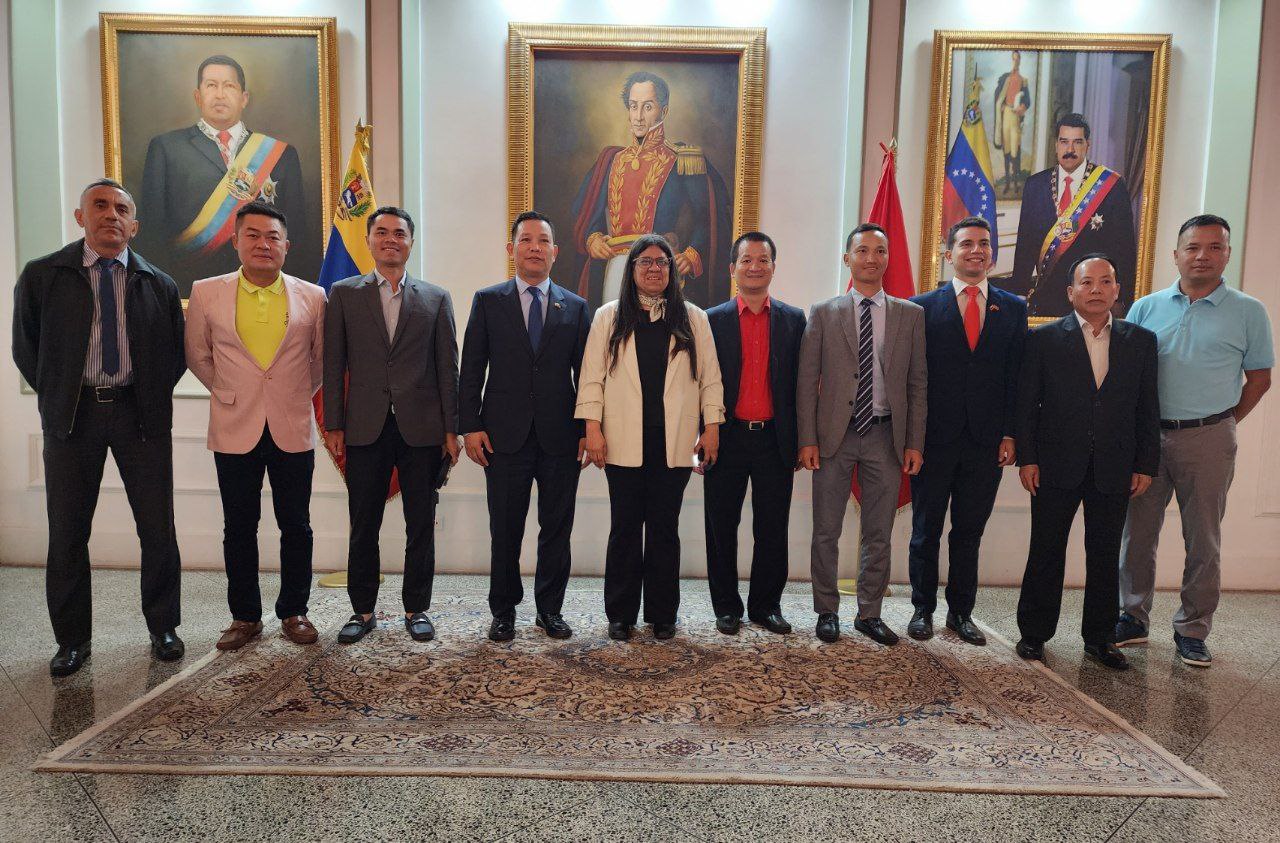
Vietnamese and Venezuelan diplomats gather for a photo. Photo: MPPRE.

Orinoco Tribune – News and opinion pieces about Venezuela and beyond
From Venezuela and made by Venezuelan Chavistas

Vietnamese and Venezuelan diplomats gather for a photo. Photo: MPPRE.
The cooperative relations between Venezuela and Vietnam have been strengthened to the point of becoming a “Comprehensive Association,” as highlighted by the ambassador of the Asian country, Vu Trung My.
In an opinion article in which he recalled the 78 years since the independence of the Asian nation, the diplomat indicated that relations between both countries began on December 18, 1989, and were consolidated in 2007.
“Since then, we have regularly maintained exchanges of high-level delegations, generating political trust,” stated Vu Trung My.
He highlighted that since the arrival of the Bolivarian revolution, President Hugo Chávez visited Vietnam twice (2006 and 2010), and President Nicolás Maduro visited in 2015.
On the part of Vietnam, the General Secretary of the Communist Party of Vietnam Nong Duc Manh visited Venezuela in 2007, National Assembly Speaker Nguyen Van An visited in 2006, and President Nguyen Minh Triet visited in 2008.
More than 50 agreements
During these years of relations, the ambassador noted, the two countries have signed more than 50 agreements in many fields, established important cooperation mechanisms. and implemented many exchange projects.
“Cooperation in the oil sector [and] Vietnam’s agricultural research projects in Venezuela have achieved good results, developing five high-yielding varieties of rice, contributing to guaranteeing Venezuela’s food security, among others,” Vu Trung My wrote.
Full support
In this sense, Vu Trung My stated that the Communist Party, the government, and the people of Vietnam highly value these warm relations with Venezuela.
This has been evidenced in the support that Vietnam has provided to the efforts of the Venezuelan government to promote political dialogue respecting the provisions of the Constitution of the Venezuela.
Vietnam has also contributed to Venezuela strengthening ties with the Association of Southeast Asian Nations (ASEAN) to bring benefits to both parties for peace, cooperation, and development in both regions and in the world.
“In the international arena, the two countries have always positioned themselves to support each other’s just cause,” the ambassador wrote.
There are many opportunities on the path to the development of bilateral relations between both countries, observed Vu Trung My, in various sectors such as trade, agriculture, energy, education, health, information technologies, telecommunications, software development, electric vehicles, education, and training.
Peace diplomacy
The Vietnamese diplomat emphasized that his country will continue to support the relationship of friendship and cooperation with other countries on the basis of respect for national rights.
He highlighted that Vietnam persists in the guidelines of independence, sovereignty, multilateralization, and diversification of foreign relations, putting national interests before anything else.
“We are fully convinced that the relations of traditional friendship and the comprehensive partnership between Vietnam and Venezuela will continue to develop and deepen as well as achieve greater achievements in the causes of the construction and defense of the Vietnamese and Venezuelan homeland,” wrote the ambassador.
‘Obama’s Man in Africa’ Under House Arrest as Popular Coup Rocks Gabon
78 years of triumph
Vietnam has had to face several colonization attempts, from which it has emerged victorious, throughout its history .
It has freed itself from the chains of the French (1954) and the United States (1975), establishing itself as a beacon for the peoples’ revolutionary struggle for sovereignty in the 20th century.
“After national reunification, under the leadership of the Communist Party of Vietnam, Vietnamese inhabitants carried out economic recovery step by step and waged two resistances against aggression at both ends of their border, protecting independence, sovereignty, and territorial integrity. of the country,” Vu Trung My recalled.
After these processes of struggle and applying a renewal policy for 37 years, Vietnam was able to accelerate its economic growth, “becoming an emerging economy in dynamic development.”
In the last 10 years, the average annual growth rate of Vietnam has been 6%, one of the highest in the region.
Vietnam’s GDP is estimated at $409.3 billion, ranked 37th among the countries of the world. “In 2022, the GDP growth rate was 8.02%,” wrote Vu Trung My. “It is among the countries with the highest growth rates in the world. GDP per capita reached US $4,110, while in 1990, it was only US $100.
Meanwhile, poverty was reduced from 58% in 1993 to around 4.3% in 2022.” The political system and the great unity of all the people has been strengthened, with sociopolitical stability, maintaining national independence and sovereignty,” wrote Vu Trung My.
A revolution was brewing
On September 2, 1945, in historic Ba Dinh Square, in the capital of Vietnam, Hanoi, President Ho Chi Minh solemnly read the Declaration of Independence, giving birth to the Democratic Republic of Vietnam—the first worker-peasant state in Southeast Asia—today the Socialist Republic of Vietnam.
The socialist revolution triumphed in August, 1945.
“Under the wise leadership of the Communist Party of Vietnam and President Ho Chi Minh, many difficulties were overcome, achieving independence and total freedom,” recalled Vu Trung My, who highlighted that since that moment, the Vietnamese have been side by side raising the red flag with the yellow star.
(Últimas Noticias) by Víctor Lara
Translation: Orinoco Tribune
OT/KW/SL